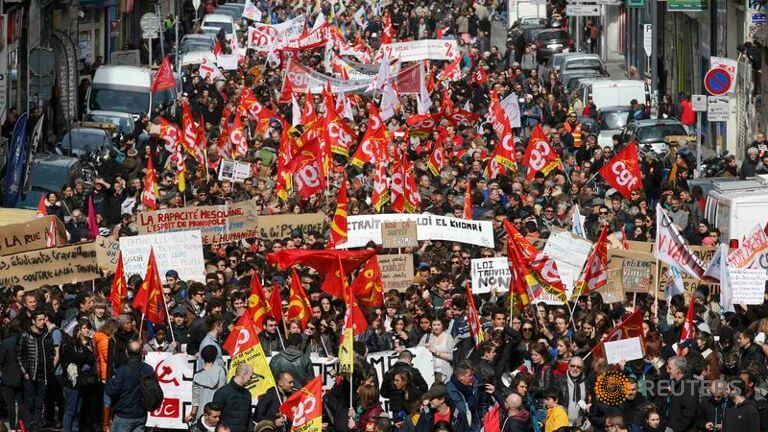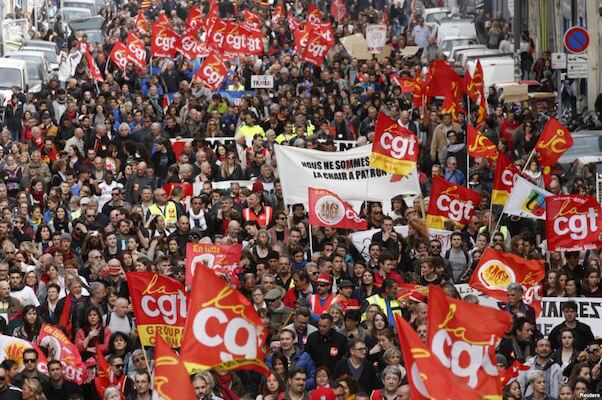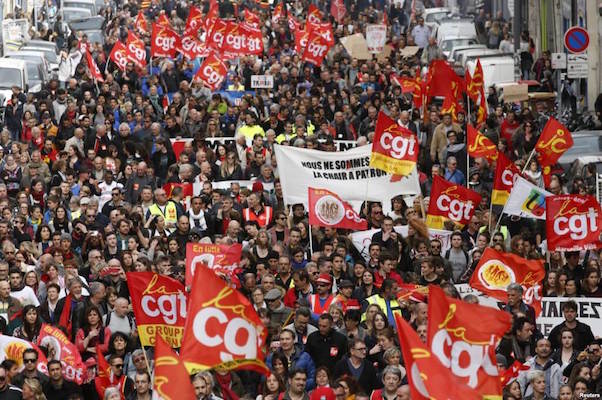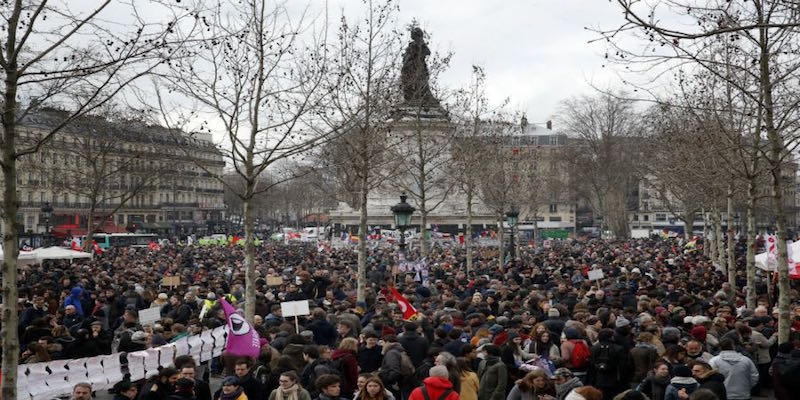By Boris Kagarlitsky
French always celebrate May Day big. This is not an official holiday like it is in Russia. But demonstrations they hold were always massive and festive. Political marches organized by the unions and the left are institutionalized here, integrated into the system of national rituals, which strengthen the foundations of French democracy and political culture of French republic.
In this sense, May 1 in Paris always differed sharply from what was happening in Berlin. For the German radical leftists May Day is almost synonymous with the fistfight. Fighting between anarchists and police has long been a tradition here. The famous “Black Bloc” mobilizes all its strength to challenge the forces of law and order on this day. The police, in turn, use all available means, and sometimes resort to provocations.
This time around, however, the main reports of street battles came not from Berlin, but from Paris. Demonstrators protesting against the new Labor code, clashed with the police at the Place de la Bastille. Of course, these were the young people who did the fighting, while the older generation of the demonstrators was more than anything, frightened and shocked.
The riot participants were nothing like the intelligent and decent activists of the French left. They are strikingly different, not only from the progressive professors and union bureaucrats, but also from the radical students who built barricades in Sorbonne in 1968, while coming up with showy slogans and citing philosophical works of Jean-Paul Sartre. This time Paris protested in a different, gloomy and angry way, just like Germans normally do it.
The guys who fought the police on the Place de la Bastille on May 1, have not read Sartre and Foucault. They do not read at all. They do not discuss the philosophical trends and do not study at the Sorbonne. They do not study or work at all.
In 1968, the protest turned into a fun countercultural game, which is incomprehensible and alien for today’s rebels. The modern day protesters just unload the accumulated resentment against the society, politicians and intellectuals, which include the left. The effective abstractions and beautiful slogans are totally alien to them. They are representatives of the first generation in the last fifty years whose standard of living is worse than their parents’. They know that the society does not create any prospects for them, and does not give them any chance to improve their social status.
So what has happened?
French society and political culture have changed. These changes were accumulating gradually over the decades, but the intellectual and political elite worked hard to pretend that nothing was happening. The left and the right in a touching unity ignored the process unfolding in front of their eyes that began back in 1995. It all started with a strike of public sector workers against the attempts to cancel the “benefits ” for those who worked for the state. Suddenly, for the authorities, the press and even for the trade unions, the people, who were not affected by the proposed change, overwhelmingly supported the strikers. Workers in the private sector stood in solidarity with their colleagues, employed by the state. Transportation workers strike led to a massive influx of people into the streets.
The powers that be were frightened and retreated, but the left intellectuals, who like to talk about the disappearance of the working class, which proves (sigh!) that such movements are doomed, experienced not less of a shock.
Events of the 1995 demonstrated the growing cultural and psychological gap between the elites and the majority of the population. But no one on the political Left has made the necessary conclusions, nor could they see that what was happening was the beginning of a new confrontation, a confrontation on a much larger scale than what has gone before, and most importantly, the confrontation developing by the new rules.
The gap was not only political and class based, but also emotional and psychological. The elites were unanimous in their support for the European integration, the Maastricht Treaty and the neoliberalism; they joined forces to carry out the dismantling of the public sector and the welfare state. Left, at first glance, were critics of such a course, but the fact of the matter is that their abstract ideological rhetoric had nothing to do with the practical resistance. In fact, the difference between the two parts of the political spectrum consisted only in the fact that some have sought to implement a neoliberal policy persistently and consistently, while others called for restraint and humanism.
After the strikes of 1995 the left government came to power, but it continued the right-wing course. And so it happened every time when the left returned to power. Socialists are formally responsible for the neo-liberal course. They were unanimously criticized by the more radical groups – the Communists, The Greens, the Left Front, and the new anti-capitalist party. But, alas, these same groups invariably supported the Socialists, as soon as the issues of power and elections would appear on the agenda. Everybody was well aware of the fact that the Socialist Party can count on the loyalty and support of other left-wing groups, no matter how far it might move to the right.
The abstract reasoning of the intellectuals about the evils of capitalism and calls for a “humanist utopia” had nothing to do with the real life: both sounded nice, but would rather distract the people from the political struggle than stimulate resistance. The Socialists linked themselves closely with the European Union, the Brussels bureaucracy, and financial capital, becoming the main force to conduct practical dismantling of the social gains of the French. Other major left-wing organizations have proved to be nothing more than their accomplices. Figuratively speaking, while the Socialists robbed the ordinary men on the street, the “anti-capitalist left” were on the lookout.
The gap between the institutional policies and the real public sentiment grew, increasingly becoming insurmountable. No matter what the politicians proclaimed, the men on the street very quickly and very firmly learned two truths. First, there is no fundamental difference between the Socialists and the “anti-capitalist left”. And second, there is no fundamental difference between the traditional “left” and the usual “right”, with the only difference being that the “left” talks and lies more.
But if there is no confidence in the leftist parties, who can organize and lead the resistance? A new logic of social struggle arose spontaneously, where the trade unions and grassroots movements, only nominally associated with the Left became the main mobilizing force for mass protests. Moreover, the rank and file members of these movements began to show sympathy for the National Front, which little by little absorbed the frustrated activists of the left-wing organizations. Street protests and strikes have become the main method of resistance. And until the mid-2000s, this struggle managed to give results. The government was forced to retreat time after time.
The last success of the grassroots resistance was the fight against the “Law of first employment”, which canceled many of the social and labor rights of young people. Referendum on the European constitution failed as well. This project approved in Brussels aspired to turn the neo-liberal principles of economic and social policies into the constitutional provisions for the entire continent. It was revealing that among those who tried to persuade the French to accept these rules were not only the dull apparatchiks of the Socialist Party, but also the famous revolutionaries of the 1960s and 1970s, Daniel Cohn-Bendit and Toni Negri.
The French were willing to tolerate the institutionalized betrayal of the intellectuals and parties as long as the society maintained a kind of a veto – by coming out in the streets, or by organizing a referendum, the people could block decisions made by the political elite. But in 2010, an event took place, which changed the rules of the game once and for all. Administration of Nicolas Sarkozy made another attempt of pension reform. Not only did the age of retirement was raised, the pension savings, which the Government subsequently used to prop up the financial sector, were confiscated. Although nominally citizens offered a choice – to retire at the age 62, 65 or 67 years, the text of the law was drafted so that an opportunity to retire early received only those who continuously worked since the age of 12 … provided that hiring young people of this age is prohibited by other laws.
The law on pension reform was not just antisocial, it purposefully mocked the people of the republic. It is not surprising that it elicited the most genuine rage. The polling revealed that 80 % of the population was against the reform. Strikes and demonstrations swept France. However, contrary to their usual modus operandi, the government did not retreat, demonstrating that public opinion did not mean anything to them. President Nicolas Sarkozy was well aware that in this way he deprived himself of chances for re-election, but sacrificed himself for the common interests of the political establishment. The aim was to humiliate and demoralize society, to prove to the French, that the democracy was over and that their opinions did not matter anymore. Sacrificing the career of this, not too lucky politician, was worth it.
Voters punished Sarkozy by failing to re-elect him. But socialist Francois Hollande who replaced Sarkozy left the reform in place. The protests ran into a dead end. The establishment won, proving to the French that the democracy and the republic in the usual sense are over. The republican government was replaced by a genuine oligarchy.
Not surprisingly, Hollande soon became the most unpopular French leader, breaking the record of Nicolas Sarkozy. But in terms of electoral collusion between right and left this no longer mattered. The only alternative was the National Front of Marine Le Pen, which all other parties have tried block from the parliament and the municipalities, despite the fact that the voters gave NF up to 40% of the vote. At the same time the origin of NF caused real concern. Everybody knew too well the party’s founder Jean-Marie Le Pen as a reactionary and an anti-Semite. His daughter, Marine Le Pen has positioned herself as voice expressing the interests of the working people, she diligently scrubbed the extreme right from the ranks of the party, not sparing even her own father. But many French people still distrusted her. After all, politicians lied to them so many times.
Dissatisfaction was to boil over not at the ballot box but in the streets. What was needed was just an occasion. The cup overflowed with the new draft of the Labor Code proposed by the Socialists. This document was even more provocative and deliberately antisocial than Sarkozy’s pension reform. The eight-hour day is canceled, the working week may be extended to 48 hours, and the overtime pay is reduced to 10 %. Neither of the right-wing governments ever tried anything like this.
The “anti-capitalist Left”, of course, criticized the project. But dropping the support of the Socialist Party in the next election was out of question. While the Socialists were preparing a draft of the Labor Code, their “neighbors on the left,” called for voting for this party at the regional elections in the name of struggle against the “threat of the National Front.” And even more so, the confrontation with the Socialists in presidential elections was out of question. On the contrary, the nomination of a unity candidate in the first round was discussed.
Not surprisingly, the usual pattern of political behavior collapsed. It was the perfect storm: self-discreditation of the Left, social and economic crisis, the rift between the society and the political system. But most importantly, a generation came to age, which grew up with a sense of resentment and frustration, whose personal experience brought them to realization that the existing institutions are hostile.
The radical students of 1968, after they had a chance to show off on the barricades in the Latin Quarter, started their own careers, and proclaimed that the only possible strategy for changing society “has to come long way through the institutions.” By the 2000s, this path has led many of the former radical students into prominent positions in parliament and government, banks, media and universities. But the society has changed in a completely different way than it was promised by the rebel intelligentsia. It dramatically shifted to the right. The change brought less democracy for the French society, not more.
The “New Left” was either defeated, or integrated into the system, becoming a part of the neo-liberal bloc. It was replaced by the new rebels: the less-educated (due to the education crisis generated by the neo-liberal reforms) generation of unemployed young people, whose only way forward is through a confrontation with the institutions.
When this youth rebelled in Amiens suburbs in 2012, a few guys set their school on fire. When caught by the police, they explained their action by the fact that the teacher of Literature sadistically abused them by forcing to memorize verses of Racine. The leader of the Left Front called these guys “Amiens cretins”. But the problem was not the intellectual level of these individuals, but the changed social situation. Poetry and beautiful language are useful in a society where citizens are given an opportunity for self-actualization by climbing the career ladder. Why would people, whose public speech will most likely be reduced to: “Next in line” (if they are lucky), want to know the verses of Racine?
The culture of violent protest was not brought to France from abroad. It gradually matured in the immigrant suburbs of large cities, where the accumulated anger periodically broke through pogroms and riots. The difference between “white” youth and the descendants of immigrants has worn off over time. It was the Arab and African youth, who ultimately created a model of behavior for the new generation of angry young Frenchmen. The integration occurred. But not through the multiculturalism and political correctness, cultivated by the liberal elite, but through anger and protest, uniting young people regardless of color or creed.
The surge of youth violence previously completely atypical for France (at least for its “white” population) is a symptom of change that is yet looming. The conflict between the society and the authorities is supplemented by the conflict between generations, as older people are more willing to play by the rules, even knowing that the establishment constantly violates these rules, while the young people do not feel a slightest respect towards the political system.
Over the years, almost all of the French, regardless of the differences in their political views, religion and ideology, believed in the republican values. And until now, the majority continues to believe in them. But these values have been vulgarized and discredited by the elites. Now the social struggle will develop according to a completely different set of rules.
The alienation between the state and the society, which is very much familiar to people living in the east of Europe, became a fact of life at the homeland of Voltaire, Robespierre, and Jaures.
Boris Kagarlitsky is the Director of the Institute of Globalisation and Social Movements, a TNI fellow and co-ordinator of the TNI Global Crisis project and Director of the Institute of Globalization and Social Movements in Moscow, that also runs Rabkor. He is also member of the edotirial board of Defend Democracy Press.
Boris’s latest books are Empire of the Periphery: Russia and the World System (Pluto Press, February 2008), The Revolt of the Middle Class (Kulturnaya revolutsiya, 2006). He won the Deutscher Memorial Prize for his book, The Thinking Reed: Intellectuals and the Soviet State (Verso 1988)











